Chicken owners do not find the necessity to set the alarm on their phones. Hearing their roosters have their cock-a-doodle-doo routine at four o’clock in the morning had always been their natural alarm. Roosters that crow is a common occurrence. Therefore, do hens crow just as much as the roosters?
Do Hens Crow like a Rooster?
While we have established that it is an everyday occurrence for roosters to crow, it is not typical for hens to do the same. Hens crowing is a rare occasion. Therefore, it would be unusual if you hear a hen crow because it’s not an innate behavior for them as a chicken. Although hens can crow, the circumstance does not happen as regularly as the roosters crowing.
However, even if hens do crow just like the roosters do and sound the same, they are certainly not as loud and powerful as roosters. Regardless of the age of the chicken, young or adult, they are still capable of crowing.
If your backyard chicken only consists of hens, but you suddenly hear one that crows, then it may be because it is a mature and alpha hen. One of the reasons why it is crowing is because it is trying to introduce itself as a dominant protector of the flock, especially since the coop is without a rooster.
Do Hens Crow at Dawn?
Actually, it is not typical for hens to crow at dawn like roosters. Also, the sounds hens make are different from the crowing of roosters, so it is usually possible to distinguish the gender based on the sounds they make.
Why are My Hens Crowing?
Chicken breeds well-known for hens that crow are Rhode Island Red Breeds, Leghorn, and Longcrower. Longcrower is a rare chicken bloodline that brings forth hens that crow, similar to a rooster. Hens that crow is desired and very much admired by chicken owners who breed. Apart from long-crowers, there are diverse reasons why your hen started to crow like a rooster.
1. Pecking order or a Flock Hierarchy
A pecking order usually occurs if there is no rooster in a flock of chicken hens. Pecking order is when hens emphasize their declaration about the reign and dominance over all the lower-ranking chicken hens in the coop.
To do this, the hen has to start crowing like a rooster to prove itself and its worth. According to studies, the sole reason roosters crow is to declare dominance and colony among the flock, which is similar to why hens start to crow. Ergo, power-tripping is present.
Due to the pecking order, relentless bullying will eventually happen, resulting in chaos in the chicken coop. The masculinity attribute of the chicken alpha hen will continue if no action is done on the part of the chicken owner. This is where the importance of being a responsible chicken owner comes in. Maintaining peace and order in the coop is essential to avoid future nuisance.
The solution to this pecking order is to immediately isolate the alpha chicken hen among the rest and observe changes before introducing it back to the flock.
Watch the video to learn more about chicken pecking order problems and signs
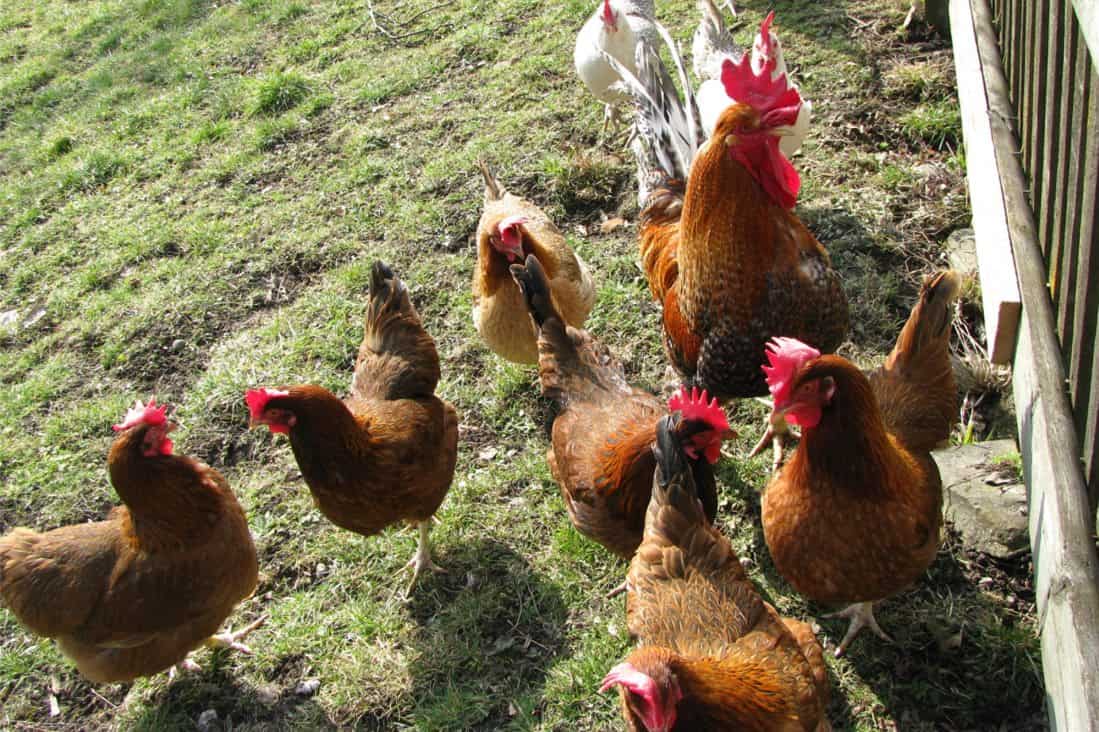
2. Age, Diseases, and Hormonal Imbalances
Age, disease, and hormonal imbalances are some factors why your hen starts to crow. As hens begin to age, there is a high possibility that they may undergo some crowing phase. Disease and hormonal imbalances affect each other, which can lead to hens starting crowing.
Just like humans, hens, too, have two ovaries. Though they have two ovaries, only one is functioning: the left one– the ovary-producing egg. However, diseases and injuries are inevitable occurrences.
The left ovary produces the female hormone estrogen. On the other hand, the right ovary produces male hormones. Over time, the left ovary of every hen has the tendency to be damaged, which will prompt the right ovary to develop.
Therefore, sex reversal takes place. Thus, producing male hormones can make the hen carry and see itself as similar to a rooster. Both external and internal diseases may cause ovarian injury or what we humans call ovarian cancer. And sometimes, chickens also start to crow while laying eggs.
3. Dietary Issues
Though ovarian cancer can still be avoided if a responsible chicken owner can provide all the nutrients the chickens need in their body, unhealthy and malnourished chickens might suffer from premature damage in their ovaries.
Calcium deficiency can cause the shells of the eggs to be thin and brittle. Thus, when a hen starts to lay eggs, there is a tendency that the internal pressure of producing an egg can cause internal damage to the hen’s reproductive system.
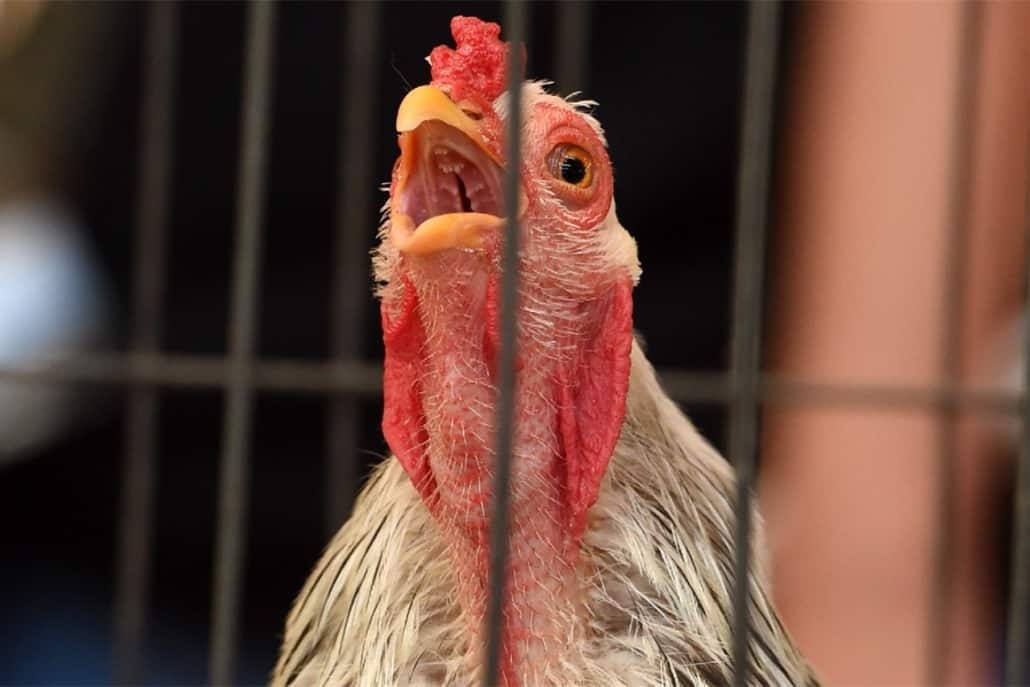
4. Gender-switching
Although we have acknowledged that damage to the ovaries can cause hens to display rooster-like behavior, such as crowing, it’s important to note that your hen can’t actually convert into a rooster.
This sometimes makes it change its hormone and can also acquire a rooster’s physical traits and features. Some of these include the wattles, plumages, and sudden growth of the comb, but the worst thing that could happen is to stop or slow down egg production.
5. Are you sure that your hen is not a rooster?
A cockerel or a rooster typically starts to crow at around two or three months of their age. Although this is unusual, it could still happen. It is a common mistake made mainly by hatcheries. Frequently, they tend to mistake the identity of a baby chicken, whether it is a hen or a cock. This occurs for the sole reason that methods to identify its gender are not hundred percent accurate.
6. A rare breed of crowing chicken: The Longcrowers
From the name itself, undeniably, long-crower chicken breeds have hens that crow. It is a rare poultry breed introduced under the T’ang dynasty of ancient China and most parts of Asia and Europe. With the name given, these chickens are named Longcrowers because the duration of their crow is longer than the normal ones.
5 Tips on How to Stop Hens from Crowing
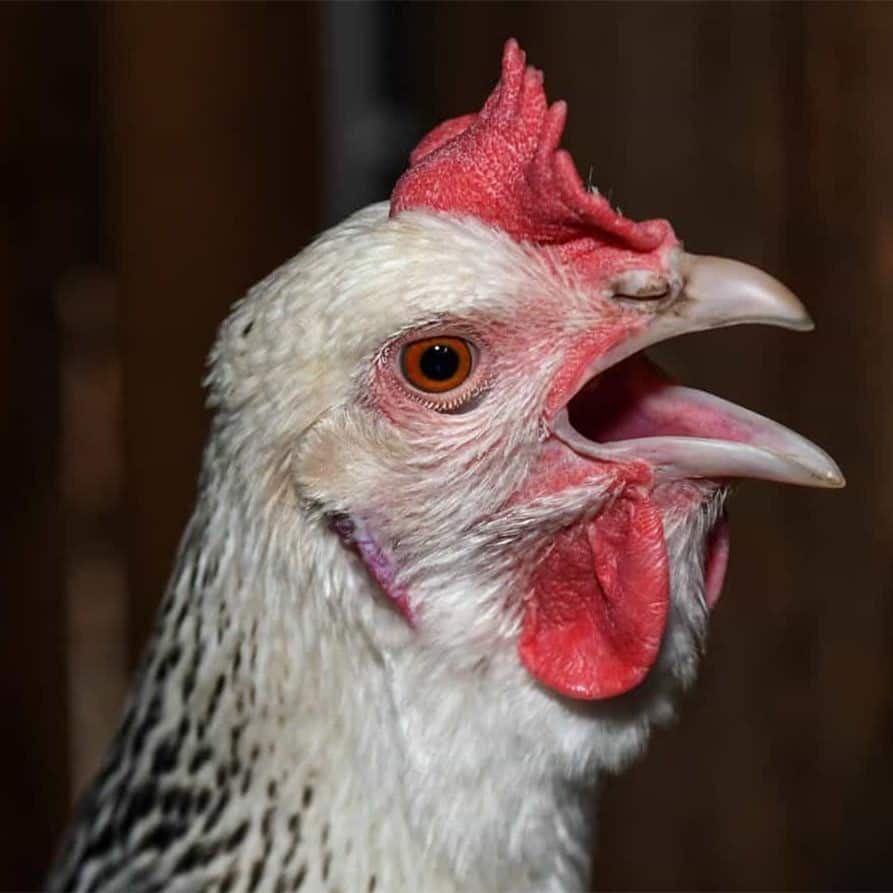
Want to stop your hen from crowing, here are some tips:
1. Isolating the Crowing Hen
Isolating a hen involves separating it from the rest of the flock. This is usually done to reduce its dominance and prevent aggressive behavior towards other hens, leading to overall reduced crowing for dominance among them. Removing an assertive bird from their social hierarchy makes them more peaceful when reintroduced back into the group.
2. Introducing a Rooster
On another note, introducing a rooster can positively reduce overall aggression in hens since he will establish himself as an alpha male within their structure. The presence of this figurehead helps maintain order by reducing competition between birds which could lead to crowing or excessive anxiety levels resulting in noises such as loud clucking or squawking.
3. Make use of the No-crow Collar
It is a little band placed all around the neck of the rooster to make sure that it is quieter when it crows.
Watch the video to learn more about no-crow collar
4. Adding News Hens
Adding new flock members has also been shown effective at lessening noise produced by hens. Although there may be changes in social dynamics initially after adding new individuals due mainly because these additions change roles, such as being dominant becomes shared instead. Over time stress decreases, allowing quieter living conditions.
5. Providing Clean and Decent Living Conditions
Although it does not wholly stop chickens from crowing, it is still considered to be good prevention. A healthy and robust chicken means a low chance of damaging the ovaries, which often causes gender-switching due to hormonal imbalance.
What do the Normal Hen Noises Sound Like?
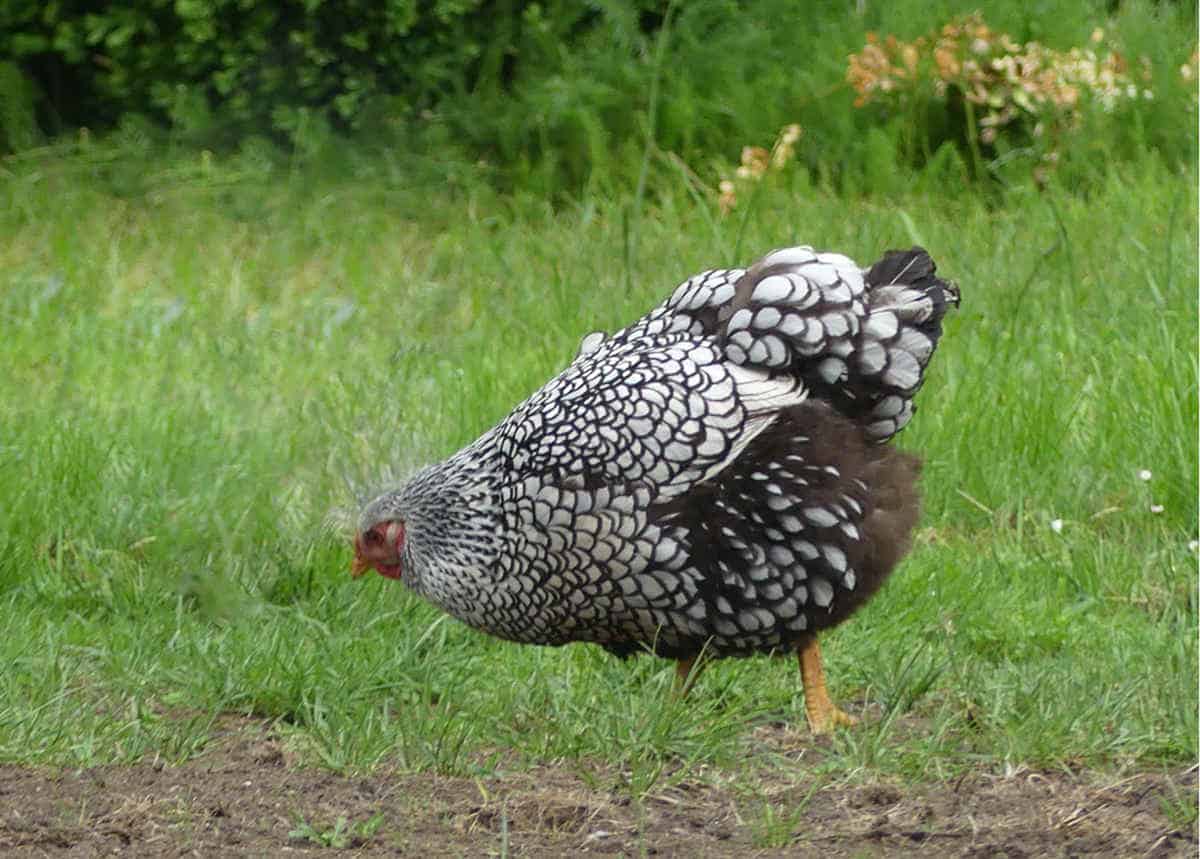
If you are a backyard chicken owner and have had it for years already, you can now differentiate the noise your hens make. This is already a piece of cake for long-term chicken owners, but for those new to poultry life, you may think that all the noises they make and the crow are just the same.
-
Cluck of Contentment
This sound is often heard whenever the hens are in free-range mode. It is like a low murmuring sound that makes you feel calm and peaceful. The sound hints to all the chickens in the flock that they are all doing well.
-
Alarm Call
One of the most common noises a chicken can make. However, you have to make sure that the alarm call is the one that will not make you rush into the coop. If the sound is persistent, loud, and sharp simultaneously, then something wrong is going on. This alarm call is a cry for help simply because a predator is present.
-
Broody Growls
Broody hens tend to make broody growls because it’s not in the mood to leave their nest. They will stop these noises once their broodiness subside.
-
Egg Song
The egg song is frequently heard when multiple chickens compete with whoever gets into the nesting boxes to brood or help hatch the chicken. It is a persistent and loud noise that only halts whenever it reaches its destination.
-
Food Call
The rooster mostly makes the food call noise, but if you do not have one, then the alpha hen does it when it has found good food to share with the flock. This noise means that it is broadcasting to everyone about the excellent meal it has found.
Is there a chance that hens will turn into roosters?
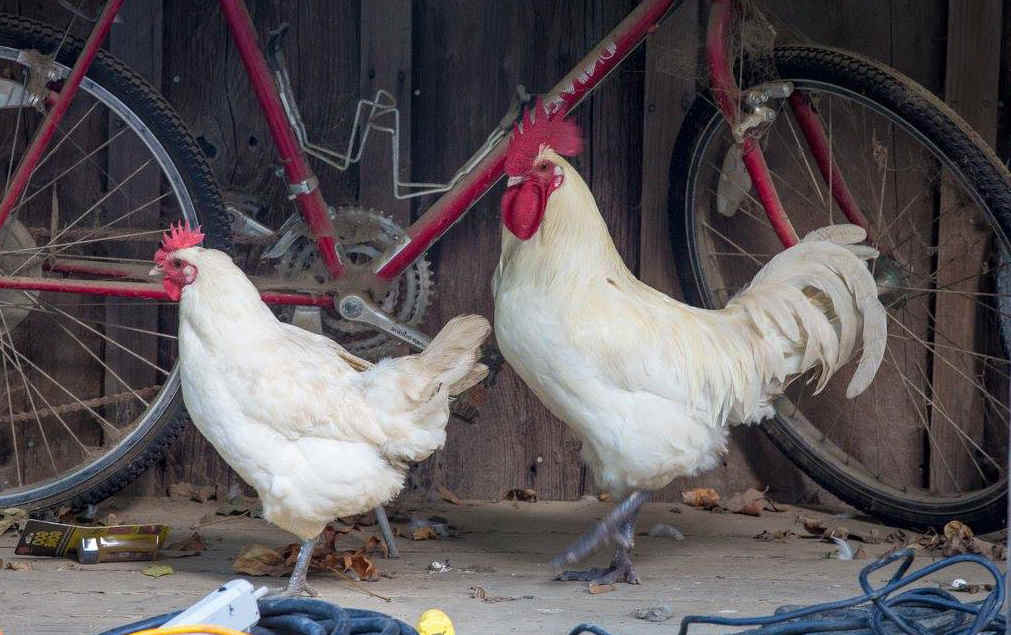
While there’s a chance that a hen may display rooster-like behaviors due to hormonal changes, including in its physical attributes, it’s important to clarify that a hen can’t physically turn into a rooster. When the left ovary gets broken, the right ovary will step up. However, it is the ovary that produces male hormones. Therefore, it can cause the hen to act and look more similar to a rooster.
Summary
The response to the question “Do hens crow?” is that it’s possible but very rare. Hearing hens crow is not common, and if it happens, it may be a sign of hormonal imbalances or other issues that require attention. And they also crow like a rooster. Although there are various reasons that prompt hens to crow, it is still vital to check the reason why hens started to crow for you to take immediate action when needed.
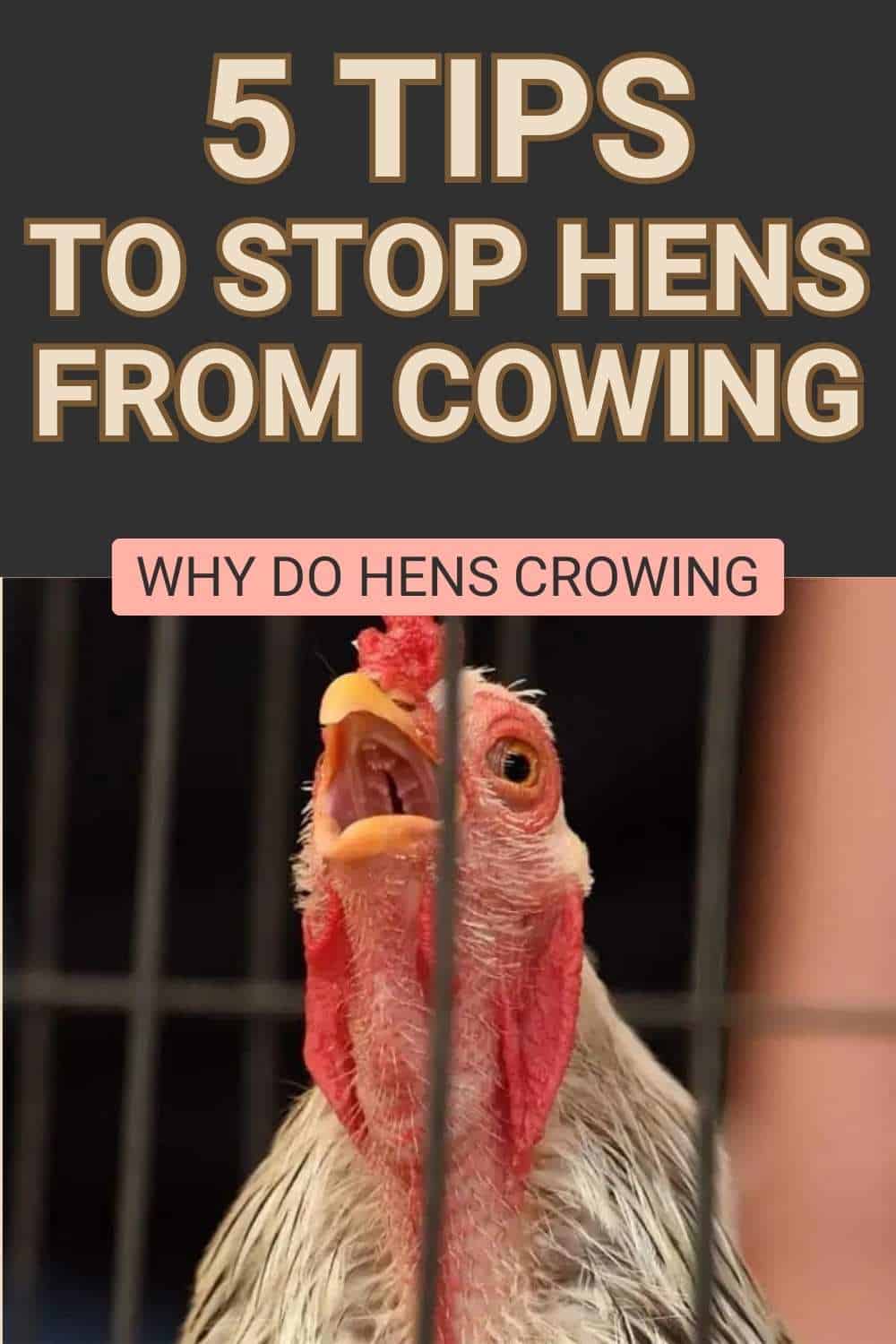

Joseph Hudson has been raising chickens for over 15 years. In 2018, he completed the Agriculture & Natural Resources program at Mt. San Antonio College. He currently raises over 1400 chickens on his 7.5-hectare farm. He keeps sharing his experience on raising healthy and happy chickens on Chicken Scratch The Foundry.
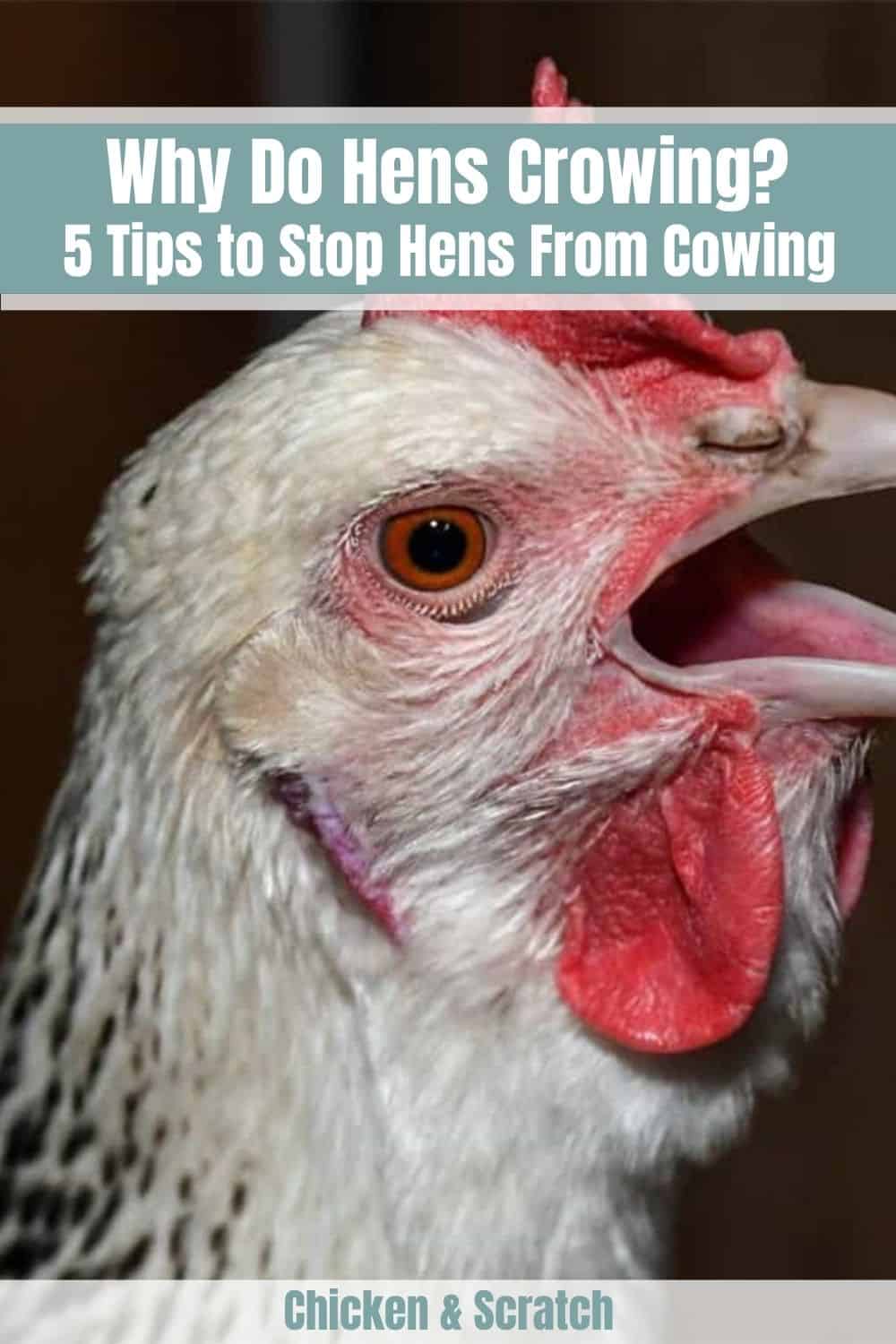







Thank you for this article – very helpful! I do have a question however …they sometimes do in order to step into a protector alpha hen role in order to establish a sense of safety and establish a sense of order amongst the flock members in cases where a rooster is not present at times – is this just a thing and not all batches of tens will feel this need at any point but more temperament of the particular group of hens in any given flock and/or other outlier factors that could be present such as not enough food and clean living spaces available to incite competitor scarcity chaos vibes amongst the hens and therefore inducing a need for someone to be in charge of the wayward group as a whole for some semblance of stability vs outright anarchy every hen for herself cat fights and pecking order mean girl vibes? Ps lol sorry for the heavy use of metaphor for that last possibility but it came so I went with it )) – so yes to continue would those be the main or only reason and therefore when you led into the option of isolating the dominant hen to see if following solitary confinement her behavior returns to non crowing and non standing in as the biggest bully of the anarchist bully bunch? Because if so …taking any available actions to disrupt the crowing hen from this behavior since it seems like a maladaptive response that ultimately impacts the others for the worst on account of the associated behaviors and survival tactics they’d all start to portray as a result over time (and mind you intentionally for now I’m also excluding the nutrient deficiency/organ damage to cause hormonal changes content for now bc that is definitely great points to consider but also not the direction of my eventual question I’m leading up to here by the way lol) … but suppose the alpha hen taking the reins being on the line of protector role and establishing a sense of order amidst blatant chaos …I think that’s great and kind of nice so I wonder if that would be helpful should previous predators murdered (I use murdered bc I’m attached to our hens in a dog cat that also happens to produce beautiful eggs bonus kind of way to put it as succinctly as possible lol:p) so yes should prior predatory murders to former hens in the flocks over the years create a sense of need to have a hen step up to the guardian alpha as a natural survival evolutionary trait (and I ask in the context of that then surely being a plus versus a minus in the case of an alpha hen emerging out of the whole flock and of course presuming the other crow inducing factors such as negligence/damaged hormones, etc. are not present) …right? And also suppose a large goofy and kind hearted as can be 1-2 year old gargantuan German Shepard puppy the size of a fully grown bear suddenly enters the family and despite attempts to maintain total separation from their fortified as best as is possible living space from his access points throughout the yard – his playful but also terrifying to them surely attempts to pounce at the fence when they’re nearby by chance to startle the sh*t! Out of them and bark or growl menacingly in his play …suppose a factor like that and even with or without prior murdered flock members over time (possum or raccoon maybe btw – still unsure of the killer’s true form) – would that likely cause the protector chick vibe and therefore also probably be a good adaptation versus one needing correcting by the tenders to the chickens aka me and my fam?
I hope you’ve been able to follow this rambling question as I haven’t been sure where it would lead until I finally got to my eventual point I wanted to reference and seek your advice about until it was just said and done lol but if you do see where I am going with this question – I would greatly appreciate your feedback! Thank you again for your thorough information and enthusiasm! Mary aka Dina
Dear Mary,
Thank you for your comment! You’re absolutely right in observing that hens sometimes crow in order to step into a protective, alpha hen role to establish a sense of safety and order among flock members, especially in times when a rooster is not present. This behavior can be seen as a form of protection and leadership within the group.
As you’ve mentioned, the temperament of the hens and the dynamics of the group do play a significant role in this behavior. Situations like not enough food or unclean living spaces, for example, could incite competitive and unrest amongst the hens, possibly inducing the need for one to step up and take control.
Isolating the alpha hen can sometimes help reset the order of the group and bring about calm, but it’s not always a guaranteed solution. The alpha hen may continue her crowing behavior upon reintegrating and possibly intensify the unrest within the group. Each group is unique and responses will vary.
With regard to the existence of predators or perceived threats (like your large, playful German Shepherd), these could certainly add to the stress and prompt a hen to play the protective role. This behavior can be viewed as a beneficial act of creating some order amidst fear and chaos. However, for maintaining a calm and healthy group, addressing the source of stress (if possible) is vital. You might consider setting boundaries between the chickens and your dog and ensure they have a safe and protected space to avoid unnecessary stress.
As for your ‘murdered’ hens, I’m sorry to hear of your loss. Such events can indeed spark protective behaviors among the remaining hens. If the crowing hen isn’t causing too much stress on the other members of the flock and her leadership seems beneficial, intervention might not be necessary. However, if she’s creating more chaos than order, it may be worth exploring other options.
Lastly, remember that crowing in hens is not entirely abnormal, sometimes it’s simply a part of the hen’s individual personality.
I hope this answer helps clarify your queries. Each situation is unique and without knowing the specific dynamics of your flock, it’s hard to give generalized advice. Observing your flock and responding to their unique needs is always the best approach.
Thank you for your thoughtful question, and I wish your flock all the best!